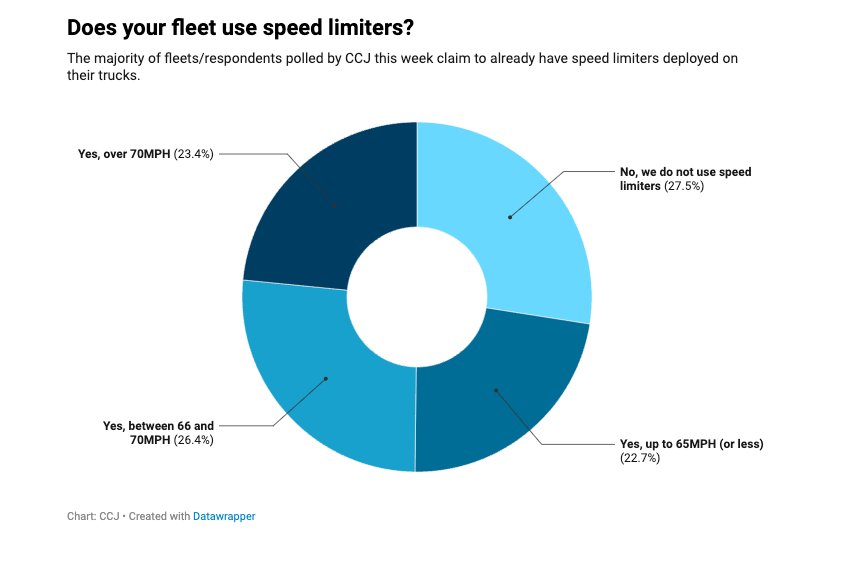FMCSA Speed Limiter Law: On the Radar for 2025

There's a better way to find loads.
Demo the Truckstop Load Board and see how easy it is to find the right loads fast .
Almost a year past the intended ruling and the Federal Motor Carrier Safety Administration has yet to implement the impeding speed limiter law. While the exact speed proposed is still unclear, the industry is preparing itself for the far-reaching implications.
And while the most recent deadline is in the rearview mirror, the new May 2025 deadline seems optimistic since all FMCSA rules must first go through the White House Office of Information and Regulatory Affairs (OIRA) review process and OIRA hadn’t received the rule from the FMCSA.
So what’s taking so long? Well, it’s complicated. Let’s take a closer look.
Speed limiters: the background and debate
For anyone who hasn’t been following this closely, a “speed limiter” is an electronic engine control unit (ECU) that prevents an engine from exceeding a specific speed. Most heavy trucks manufactured since 1999 have ECUs, but these devices don’t define a maximum speed, and they don’t limit speed unless a carrier chooses to activate them.
Speed limiters have been the subject of research and debate since 1991. The debate intensified in 2016 when the FMCSA and NHTSA jointly announced the development of a speed limiter rule for vehicles with a gross vehicle weight rating above 26,000 lbs. The NHTSA proposed requiring manufacturers to set ECU speed limits, based on what the yet-to-be-created final rule defined as maximum speed. The FMCSA’s proposal was similar.
And so this rulemaking process began — but the NHTSA and FMCSA couldn’t decide on the maximum speed limit and the law never materialized.
In 2022, the FMCSA announced it needed a separate rule:
“This notice informs the public that FMCSA intends to move forward with a separate motor carrier-based speed limiter rulemaking. FMCSA believes that placing the requirement on motor carriers will ensure compliance with the rule, and potentially avoid confusion on who is responsible.”
With this new attempt at crafting a speed limiter law, the FMCSA defined 68 mph as the top speed limit for heavy trucks, prompting 15,000 comments supporting and opposing the proposed law. In September 2023, the FMCSA removed the speed limit from the rule.
The arguments for and against speed limiters
Most large commercial fleets are already using ECUs to control vehicle speed, according to a 2022 Commercial Carrier Journal survey:

Note, however, that these fleets have different maximum speeds, which wouldn’t be an option if the FMCSA law defines the max allowable speed for heavy trucks.
Depriving fleets and owner-operators of their right to determine their maximum speed is “government overreach,” according to some critics of the proposed law. Rep. Josh Crecheen, R-Okla., said that states need the ability to determine their own speed limits, and that any FMCSA speed limit tied to ECUs would be “arbitrary.”
Breechen introduced HR3039 last year – the Deregulating Restrictions on Interstate Vehicles and Eighteen-wheelers Act, or DRIVE Act – that would prohibit the FMCSA from creating any law about the use of speed limiters. Sen. Steve Daines, R-Mont., subsequently introduced a Senate version of that act, and the DRIVE movement has gained support and momentum during the FMCSA’s long silence.
The OOIDA, which has strongly opposed all iterations of proposed rules about speed limiters, supports DRIVE. The organization says that the law would unfairly impact owner-operators, and could:
- Cause excessive traffic jams
- Create dangerous speed differentials between large trucks and other vehicles
- Could contribute to traffic jams
- Impact timelines for moving freight
Supporters of the speed limiter law include The Trucking Alliance, a bipartisan group whose members include executives from J.B. Hunt and Schneider. The group argues that the FMCSA rule would prevent deadly crashes caused by speeding, and it also issued a plea to lawmakers to oppose the DRIVE Act.
The DRIVE Act may not get the support it needs to become a law. But that may be a non-issue if the FMCSA once again fails to reach a final version of its law.
What happens next?
It seems unlikely that the FMCSA will finalize a speed limiter rule this year, if at all. The FMCSA has been in a state of upheaval for years, with high turnover in senior leadership. And this is an election year, which typically means federal rulemaking slows.
For now, it’s a waiting game.
Topics:
Get helpful content delivered to your inbox.
Sign up today.
Find high-quality loads fast, get higher rates on every haul, and access tools that make your job easier at every turn.






